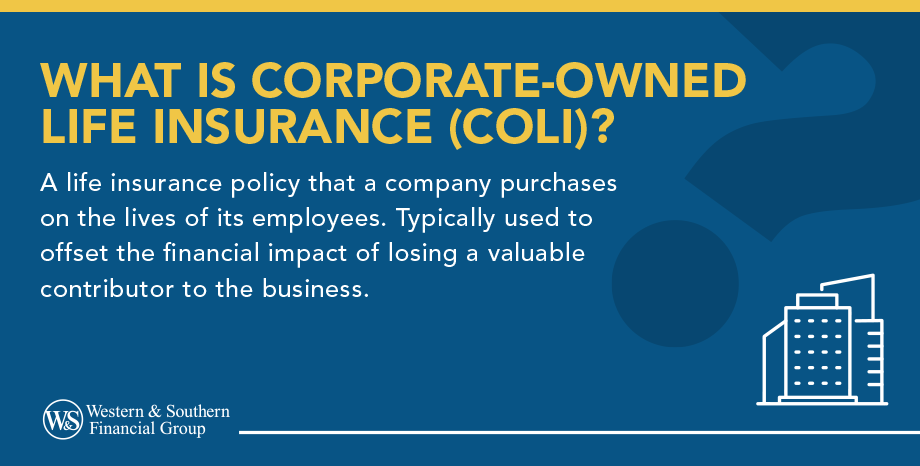

Key Takeaways
- Corporate-owned life insurance (COLI) helps protect businesses by insuring key employees and providing tax benefits.
- COLI policies can fund buy-sell agreements and offset deferred compensation costs for executives.
- The cash value of COLI grows tax-deferred, and death benefits are typically tax-free.
- COLI policies can be expensive and carry ongoing premium costs, making them best suited for businesses with sufficient resources.
- Employees may perceive COLI negatively, as the company is the policy's sole beneficiary.
What is Corporate-Owned Life Insurance (COLI)?
Corporate-owned life insurance (COLI) is a type of life insurance policy owned by a company rather than an individual. It is a policy that a company purchases on the lives of its employees.
In COLI, the company is both the policyholder and beneficiary, paying premiums and receiving the death benefit upon an insured employee's death, unlike individual life insurance, where the employee and their family hold these roles.
The company purchases the policy to insure the life of a key employee, executive, or owner. In the event of the insured person's death, the company is the primary beneficiary and receives the death benefit payout, typically used to offset the financial impact of losing a valuable contributor to the business.
How Does Corporate Ownership of Life Insurance Work?
When a company purchases a COLI policy from an insurance company, it insures the life of a key employee, such as an executive, partner, or highly skilled worker, whose death would result in a significant financial loss. Here's how the process typically works:
- Policy Ownership: The company owns the life insurance policy and is responsible for paying the premiums. The insured employee must consent to the coverage but does not own the policy or have control over it.
- Premiums: The company pays the premiums, which can be structured in various ways depending on the type of policy. Some companies opt for term life insurance (which provides coverage for a specified period), while others choose permanent life insurance policies that offer lifetime coverage.
- Death Benefit: Upon the insured's death, the company receives the death benefit, typically used to cover expenses related to the employee's loss, such as recruiting a replacement, paying off company debts, or compensating for lost revenue.
Some COLI policies provide a death benefit and accumulate cash value over time. The company can access this cash value if needed, providing an additional source of liquidity for business operations.
Pros: Benefits of Corporate-Owned Life Insurance
Corporate-Owned Life Insurance, also known as company-owned life insurance, offers a range of advantages for businesses, making it a valuable financial tool:
- Key Person Protection: As mentioned earlier, COLI helps provide financial support when a key employee dies. The death benefit can help cover lost revenue, recruit and train a replacement, and stabilize the company during a difficult transition.
- Funding Buy-Sell Agreements: Using COLI to fund buy-sell agreements ensures that the remaining business owners have the necessary funds to purchase the deceased owner's shares, preventing ownership disputes and maintaining business continuity.
- Offsetting Deferred Compensation Costs: COLI can be used to offset the costs of providing deferred compensation to key executives. The death benefit can help fund the company's deferred compensation liability, making it a cost-effective way to offer attractive benefits.
- Estate Planning with COLI: For business owners, COLI can play a role in estate planning. The death benefit can provide liquidity to the owner's estate, helping to cover estate taxes and other expenses.
Tax Benefits
One of the most compelling reasons businesses choose corporate life insurance ownership is its tax advantages. Here's how COLI can benefit your business financially:
- Tax-Deferred Cash Value Growth: Many COLI policies build cash value over time. This cash value grows tax-deferred, meaning the company does not have to pay taxes on gains while the policy is in effect. COLI is a valuable tool for companies to manage excess cash in a tax-efficient manner.
- Tax-Free Death Benefits: Usually, the death benefit paid to the company upon the insured's death is tax-free, providing significant funds without taxation, which is vital for managing the financial impact of losing a key employee.
- Business Expense Deductions: While the premiums paid on COLI policies are generally not tax-deductible, the cash value growth and the tax-free death benefits make it an attractive option for companies looking to optimize their financial strategy.
For these reasons, COLI is often part of a broader tax strategy that helps businesses reduce their tax burden while helping secure long-term financial protection.
Cons: Disadvantages of Corporate-Owned Life Insurance
While corporate-owned life insurance (COLI) offers significant benefits for businesses, companies should consider potential disadvantages before purchasing a policy. Here are the primary drawbacks of corporate-owned life insurance:
- High Upfront Costs: COLI policies can be expensive, especially whole life or universal life insurance. The premiums for these policies are often higher than individual life insurance policies due to the larger death benefits and the cash value accumulation feature. For small or mid-sized businesses, the cost of purchasing and maintaining COLI may be prohibitive.
- Ongoing Premium Payments: The company is responsible for paying the premiums, which can be a financial burden if the company is facing cash flow issues. Unlike other business expenses, these premiums are generally not tax-deductible, making them an ongoing cost that must be factored into the company's budget.
- Taxation of Cash Value Withdrawals: While the cash value of a COLI policy grows on a tax-deferred basis, any withdrawals or loans taken against the cash value could be subject to taxes. If not carefully managed, businesses might face unexpected tax liabilities, reducing the overall benefit of the policy.
- Potential for Tax Law Changes: COLI's tax advantages, such as tax-deferred cash value growth and tax-free death benefits, rely on current tax laws. If future legislation changes how COLI is taxed, businesses may lose some of the tax benefits that made the policy attractive in the first place.
- Negative Employee Perception: Since the company is the beneficiary of the policy, employees may feel uncomfortable knowing that their lives are being insured primarily for the company's financial gain. This perception can decrease employee morale, especially if the employee feels they are not benefiting directly from the policy.
- Potential Financial Risks: The cash value of a COLI policy can fluctuate depending on the policy type and the performance of the underlying assets. Additionally, if a company cancels or surrenders the policy before the insured person's death, they may face surrender charges. These charges can eat into the cash value and result in a financial loss for the business.
- Long-Term Commitment: COLI is a long-term arrangement, and while the cash value accumulates over time, it may take years for the policy to build substantial value. For businesses needing more immediate financial resources, locking funds into a life insurance policy can reduce liquidity and hinder short-term financial flexibility.
- Potential Legal and Regulatory Scrutiny: Corporate-owned life insurance can sometimes be scrutinized as a form of "Stranger-Originated Life Insurance" (STOLI), which occurs when life insurance is purchased for individuals not connected to the insured. While COLI is different, regulatory scrutiny could arise if the policies appear to exploit tax loopholes or if the coverage amount seems excessive relative to the company's needs.
In the U.S., federal laws require companies to notify employees and obtain their consent before purchasing a COLI policy on their lives. Failure to comply with these rules can lead to fines or legal challenges.
Types of Corporate-Owned Life Insurance Policies
Not all corporate-owned life insurance policies are the same. Businesses can choose from several types of COLI policies, each offering unique advantages. The three most common types of COLI are:
- Term Life Insurance: Term life insurance covers a specific period (usually 10, 20, or 30 years). The company receives the death benefit if the insured employee dies during the term. Term life is often less expensive than other options but does not accumulate cash value.
- Whole Life Insurance: Whole life insurance covers the insured employee's entire lifetime as long as premiums are paid. These policies accumulate cash value over time, which the company can access for loans or other financial needs. Due to the lifelong coverage and cash value component, whole life insurance is generally more expensive than term life insurance.
- Universal Life Insurance: Universal life insurance is a flexible option that allows companies to adjust the premium payments and death benefits over time. Like whole life, universal life policies accumulate cash value but offer more flexibility in payment schedules and policy terms.
When Should Your Business Commit to a COLI Policy?
Corporate ownership of life insurance is not just for large corporations; businesses of all sizes can benefit from its financial protection. However, certain companies stand to gain more from COLI than others.
COLI is often more advantageous for large corporations with substantial resources and long-term financial strategies. Smaller businesses may find that the costs, complexity, and tax benefits of COLI do not outweigh the potential financial strain, making purchasing such policies less practical.
Here are some scenarios where a business should strongly consider purchasing to a COLI policy:
- Key Employee Dependency: If your business relies heavily on a few key employees or executives for its operations and financial success, a COLI policy provides key person insurance, helping protect the company from financial disaster in the event of their untimely death.
- Highly Compensated Executives: Companies with highly compensated executives often use COLI to fund executive compensation plans, such as deferred compensation arrangements. Allowing businesses to offer competitive benefits while helping secure COLI's financial protection.
- Tax Planning Needs: Businesses looking for tax-efficient ways to manage excess cash or reduce their tax burden may benefit from COLI's tax-deferred growth and tax-free death benefits.
Conclusion
Corporate-owned life insurance is important for businesses looking to help protect their financial future and crucial employees. Whether your company relies on a few top executives or simply looking for ways to optimize its tax strategy, COLI helps offers protection and financial growth opportunities. Purchasing a COLI policy helps ensure that your business remains secure even in the face of unexpected challenges.
Help protect your business with Corporate-Owned Life Insurance. Get a Free Life Insurance Quote
Frequently Asked Questions
Are corporate-owned life insurance premiums tax deductible?
Is COLI considered an asset on a company's balance sheet?
What is dead peasant insurance?
Sources
- Corporate-Owned Life Insurance (COLI): Insurance and Tax Issues - Congressional Research Service - 2011. https://crsreports.congress.gov/product/pdf/RL/RL33414/7
- Guidelines On Corporate Owned Life Insurance - National Association of Insurance Commissioners - 2013. https://content.naic.org/sites/default/files/inline-files/MDL-602.pdf
- H.R.2251 - COLI Best Practices Act of 2005 - U.S. Congress. https://www.congress.gov/bill/109th-congress/house-bill/2251
- Treatment of Certain Employer-Owned Life Insurance Contracts - Internal Revenue Service (IRS). https://www.irs.gov/pub/irs-drop/n-09-48.pdf


































